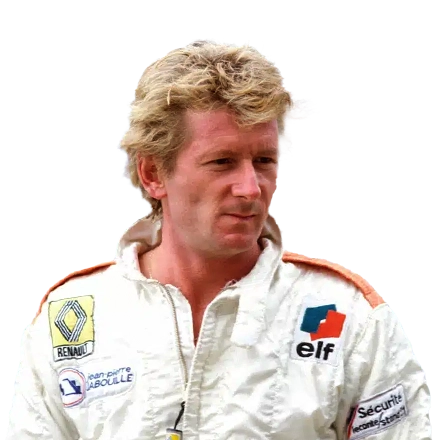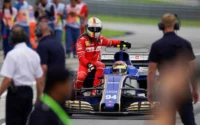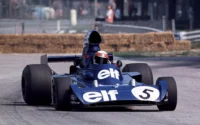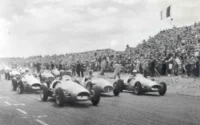Jean-Pierre Jabouille was a French racing driver, engineer, and motorsport pioneer. Between 1974 and 1981, he carved out a Formula One career with a breakthrough win in 1979, adding one more before his career ended.
| Nationality | French |
|---|---|
| Born | Jean-Pierre Alain Jabouille 1 October 1942 Paris, France |
| Died | 2 February 2023 (aged 80) Saint-Cloud, Hauts-de-Seine, France |
Known for his technical mind as much as his speed, Jabouille was the man who tamed Formula One’s first turbocharged engine with Renault, playing a prominent role in one of the sport’s most significant technological revolutions. Alongside F1, he enjoyed a long and impressive endurance racing career, competing at the 24 Hours of Le Mans from the late 1960s through the early 1990s with Alpine, Matra, Sauber, and Peugeot. He earned four overall third-place finishes (1973, 1974, 1992, 1993), cementing himself as a stalwart of French motorsport.
Climbing the Ranks
Jabouille’s career began in French Formula Three in 1967, where his engineering know-how was just as vital as his driving skill. He maintained his own car while racing to second place in 1968, finishing behind François Cevert. By 1969, Alpine had spotted his talent, bringing him on board as a development driver. This launched a varied few years in Formula Two and sports cars, highlighted by a podium at the 1973 Le Mans 24 Hours with Matra and a repeat third-place finish in 1974.
That same year, Jabouille notched a win at the Formula neo race in Hockenheim and finished runner-up in the European 2-litre series with Alpine. Formula One beckoned too, though his early forays were less successful—he failed to qualify an Iso–Marlboro in France and a Surtees in Austria.
In 1975, he struck out independently, leaving Alpine and, with Elf’s backing, built his own Formula Two chassis. The gamble paid off: he finished runner-up to Jacques Laffite, and later that year made his first proper Formula One start, coming home 12th for Tyrrell at the French Grand Prix. His big breakthrough came in 1976 when he clinched the Formula Two title outright.
Formula One Innovator
Renault signed Jabouille in 1977, tasking him with developing their radical new 1.5-litre turbocharged Formula One engine. The RS01 made its debut at the 1977 British Grand Prix, but the revolutionary power unit was plagued by fragility and punishing turbo lag. Jabouille, an engineer at heart, stuck with it. Throughout 1978, he wrestled the car into competitive shape, picking up Renault’s first Formula One points with a gritty fourth place at Watkins Glen at a circuit notorious for testing fuel efficiency, one of the turbo’s greatest weaknesses.
By 1979, Renault expanded to two cars, pairing Jabouille with René Arnoux. Jabouille delivered history: pole position at the 1979 South African Grand Prix, and then Renault’s maiden victory at the 1979 French Grand Prix, also the first win for a turbocharged car in Formula One. Though reliability limited his points haul that season, his achievement was a turning point for F1 technology.
In 1980, Jabouille claimed another victory, this time at the 1980 Austrian Grand Prix, along with two further poles. But later that year, a suspension failure at the 1980 Canadian Grand Prix caused a heavy crash, leaving him with a broken leg. He had already signed with Ligier for 1981, but despite returning to the grid, his injuries hampered his comeback. After failing to qualify for two of his four races with the team, Jabouille made the difficult decision to retire from Formula One competition.
Beyond Formula One
Jabouille didn’t leave the sport behind. He stayed with Ligier as team manager in 1982, later guiding the team’s joint effort with Curb Racing in the 1984 CART series. He also kept racing, turning his attention to the French Supertouring Championship before joining Peugeot’s endurance programme. His work helped push Peugeot to third place at Le Mans in both 1992 and 1993.
In 1994, Jabouille succeeded Jean Todt as head of Peugeot Sport. Unfortunately, their run as Formula One engine suppliers to McLaren and Jordan was plagued by poor results, and Jabouille was dismissed in 1995. He returned to the track by running his own sports car team in the International Sports Racing Series.
Death
Jean-Pierre Jabouille passed away on 2 February 2023, at the age of 80. Remembered as the man who delivered Renault’s first Formula One win and helped usher in the turbo era, Jabouille combined the brains of an engineer with the bravery of a racer.
Jean-Pierre Jabouille ‘s Formula One World Championship Career
| Active years | 1974–1975, 1977–1981 |
|---|---|
| Teams | Frank Williams Racing Cars, Surtees, Tyrrell, Renault, Ligier |
| Entries | 55 (49 starts) |
| Championships | 0 |
| Wins | 2 |
| Podiums | 2 |
| Career points | 21 |
| Pole positions | 6 |
| Fastest laps | 0 |
| First entry | 1974 French Grand Prix |
| First win | 1979 French Grand Prix |
| Last win | 1980 Austrian Grand Prix |
| Last entry | 1981 Spanish Grand Prix |
Jean-Pierre Jabouille Wins
| Win No. | Grand Prix |
|---|---|
| 1 | 1979 French Grand Prix |
| 2 | 1980 Austrian Grand Prix |
Jean-Pierre Jabouille Teammates
| 7 drivers | Involvement | First Year | Last Year |
|---|---|---|---|
| Arturo Merzario | 1 | 1974 | |
| Derek Bell | 1 | 1974 | |
| Jody Scheckter | 1 | 1975 | |
| Patrick Depailler | 1 | 1975 | |
| Rene Arnoux | 29 | 1979 | 1980 |
| Jean-Pierre Jarier | 1 | 1981 | |
| Jacques Laffite | 6 | 1981 |
Jean-Pierre Jabouille Complete Formula One Results
| Year | Entrant | Chassis | Engine | 1 | 2 | 3 | 4 | 5 | 6 | 7 | 8 | 9 | 10 | 11 | 12 | 13 | 14 | 15 | 16 | 17 | WDC | Points |
|---|---|---|---|---|---|---|---|---|---|---|---|---|---|---|---|---|---|---|---|---|---|---|
| 1974 | Frank Williams Racing Cars | Iso–Marlboro FW | Ford Cosworth DFV 3.0 V8 | ARG | BRA | RSA | ESP | BEL | MON | SWE | NED | FRA DNQ | GBR | GER | NC | 0 | ||||||
| Team Surtees | Surtees TS16 | Ford Cosworth DFV 3.0 V8 | AUT DNQ | ITA | CAN | USA | ||||||||||||||||
| 1975 | Elf Team Tyrrell | Tyrrell 007 | Ford Cosworth DFV 3.0 V8 | ARG | BRA | RSA | ESP | MON | BEL | SWE | NED | FRA 12 | GBR | GER | AUT | ITA | USA | NC | 0 | |||
| 1977 | Equipe Renault Elf | Renault RS01 | Renault – Gordini EF1 1.5 V6 t | ARG | BRA | RSA | USW | ESP | MON | BEL | SWE | FRA | GBR Ret | GER | AUT | NED Ret | ITA Ret | USA Ret | CAN DNQ | JPN | NC | 0 |
| 1978 | Equipe Renault Elf | Renault RS01 | Renault–Gordini EF1 1.5 V6 t | ARG | BRA | RSA Ret | USW Ret | MON 10 | BEL NC | ESP 13 | SWE Ret | FRA Ret | GBR Ret | GER Ret | AUT Ret | NED Ret | ITA Ret | USA 4 | CAN 12 | 17th | 3 | |
| 1979 | Equipe Renault Elf | Renault RS01 | Renault–Gordini EF1 1.5 V6 t | ARG Ret | BRA 10 | RSA Ret | USW DNS | 13th | 9 | |||||||||||||
| 1979 | Equipe Renault Elf | Renault RS10 | Renault–Gordini EF1 1.5 V6 t | ESP Ret | BEL Ret | MON NC | FRA 1 | GBR Ret | GER Ret | AUT Ret | NED Ret | ITA 14 | CAN Ret | USA Ret | 13th | 9 | ||||||
| 1980 | Equipe Renault Elf | Renault RE20 | Renault–Gordini EF1 1.5 V6 t | ARG Ret | BRA Ret | RSA Ret | USW 10 | BEL Ret | MON Ret | FRA Ret | GBR Ret | GER Ret | AUT 1 | NED Ret | ITA Ret | CAN Ret | USA | 8th | 9 | |||
| 1981 | Equipe Talbot Gitanes | Ligier JS17 | Matra MS81 3.0 V12 | USW | BRA | ARG DNQ | SMR NC | BEL Ret | MON DNQ | ESP Ret | FRA | GBR | GER | AUT | NED | ITA | CAN | CPL | NC | 0 |








